Nearly half of Monday morning’s Hopkins County Commissioners Court meeting revolved around planned solar projects in Hopkins County, especially the one greenlit for the Dike community. Dike property voice their opinions Monday morning regarding a planned solar farm in Dike, property rights and incorporation during public comments portion of the meeting.
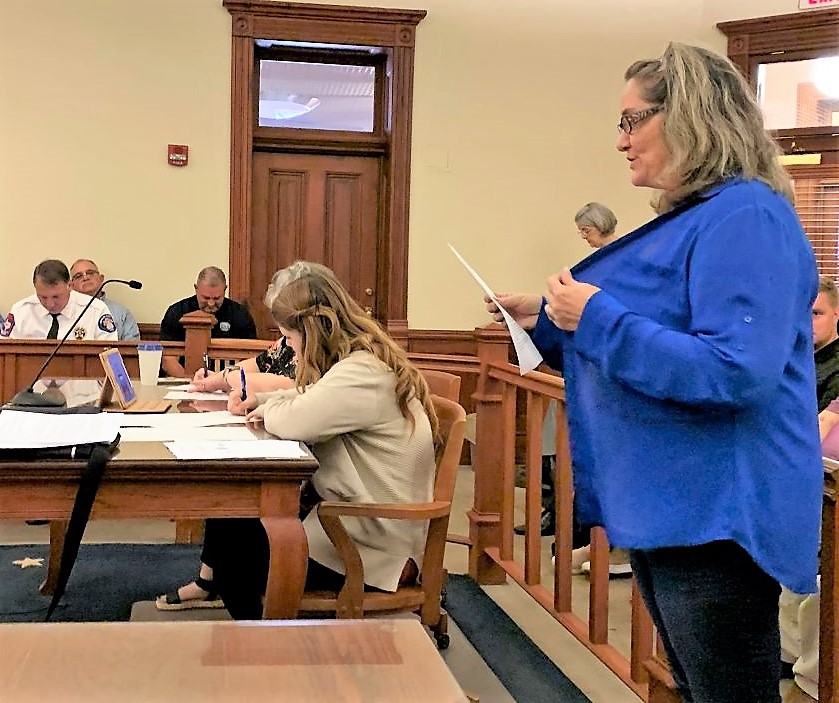
Dike property owner Michele Barnes has frequently over the last few months voiced her opposition to Hopkins Energy LLC being constructed in Dike as well as her disapproval of the Commissioners Court’s approval of an agreement granting a tax incentive to the company behind it, especially the Precinct 3 Commissioner’s approval. On Sept. 13, Barnes addressed Precinct 3 Commissioner Wade Bartley directly regarding his comments Aug. 23 to her at the last court meeting she attended.
Bartley asked Barnes if she also shares the information she presents to the Commissioners Court with the two school districts and hospital district which “did exactly the same thing we did in allowing abatements for that solar company.” He queried why she keeps picking on the Commissioners Court.
“You asked why I didn’t complain to the school or hospital district. According to the property tax mailers I received 2 weeks ago, the school provides services for the children on what affects the school, not my property. The hospital special districts provide services for emergency services, not my property. Commissioners Court makes decisions that affect property in Hopkins County, and more specifically, you make decisions that affect Precinct 3 residents that voted you into office to represent them,” Barnes told Bartley. “I am not complaining to you. I am providing data that myself and other Dike residents have researched and would like to make comments to address our concerns to this Commissioners Court.”
Barnes then addressed the Dike men who during the special July 26 Commissioners Court session spoke in opposition to Dike becoming an incorporated area. She said despite what they stated, those in favor of Dike becoming an incorporated area do not want nor anticipate any taxes being imposed on community residents. She pointed to nearby Tira, an incorporated area that does not
“They are incorporated and have no property taxes, and that is what Dike would like to do also,” Barnes said. “We do not want city property taxes to be imposed when we incorporate Dike.”
“As far as owners’ property rights, if you want solar on your property, put a solar farm on it. But when someone builds an industrial solar power plant complex, you have infringed your property rights upon those around you. This is not just some simple solar panels being placed in the ground to gather energy. It is a complex that will have substations and 80 inverters that make noise,” Barnes said
Bill Pentak with Open Doors Public Relations, who is providing community outreach for Engie, the French company behind Hopkins Energy LLC, later in the meeting said despite what some have been the solar facility will not sound like a four-lane highway – like Interstate 30 – going through Dike, nor do the panel make grinding noises as they rotate.
“The truth of the matter is it’s none of these things. I don’t expect anyone to take my word for it or Engie’s word for it. Go see for yourself,” Pentak said, encouraging any who’ve heard that to park and walk up to the gate of a completed facility to see and hear for themselves the noise level and what a project of this nature will look like.
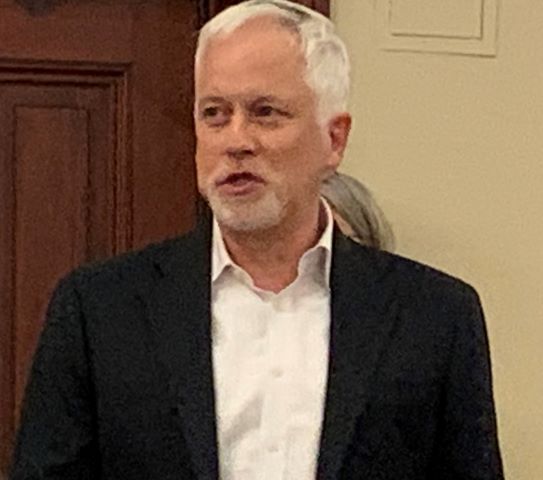
“You’ll hear the cars that will go down the road but you will not hear these solar panels. They have no moving parts in them. The only thing you will hear is occasionally – about every 15 minutes- you will hear a faint click as the solar panels turn to follow the sun,” Pentak said. “Something has been said about the inverters. You will not hear the inverters. Again solar panels have no moving parts in them. They are silent. Go and see for yourself, that’s what I encourage everyone to do today – go see for yourself.”
Dike property owners Jonas and Melanie Helm, on whose property a portion of the Hopkins Energy LLC solar project is to be located, said they’d recently visited the solar facility in Cunningham and a completed unit in Detroit area and couldn’t hear the solar panels.
“Solar is quiet,” Jonas Helm said. “You get out and you don’t hear things.”
Melanie Helm said they heard “literally no noise” from the completed portion of the project during their visit.
Barnes said she believes the foreign company constructing the solar project in Dike is showing they are trying to take over Dike, by not keeping it in one area. Crossing County Road 3518 shows their expansion into another area.
“If you want to see the devastation that will happen to Dike and other communities in Precinct 1 and 3, just go drive 30 minutes to Cunningham. There, you will see what happens to a town that does not fight against industrial solar power plant complexes,” Barnes told the Commissioners Court and packed courtroom at the regular Sept. 13 Commissioners Court meeting.
Barnes said she and others are fighting against Engie’s efforts to build the solar power plant in Dike because they want to save the rural heritage and keep the community from becoming either extinct or an industrial complex
“I just wanted to say for the record, that Engie is not trying to do anything to hurt the Dike community. We want to reach out to the Dike community. We want to work with the Dike community,” Pentak said. “Engie has set aside $900,000 for charitable philanthropic relations over the lifetime of this project. We want to work with the community. We don’t want to do one thing to hurt it.”
Four other Dike property owners and residents expressed differing opinions to those voiced by Barnes, and a public relations representative for the Dike solar project also spoke during public comments portion of the Sept. 13 Commissioners Court meeting.
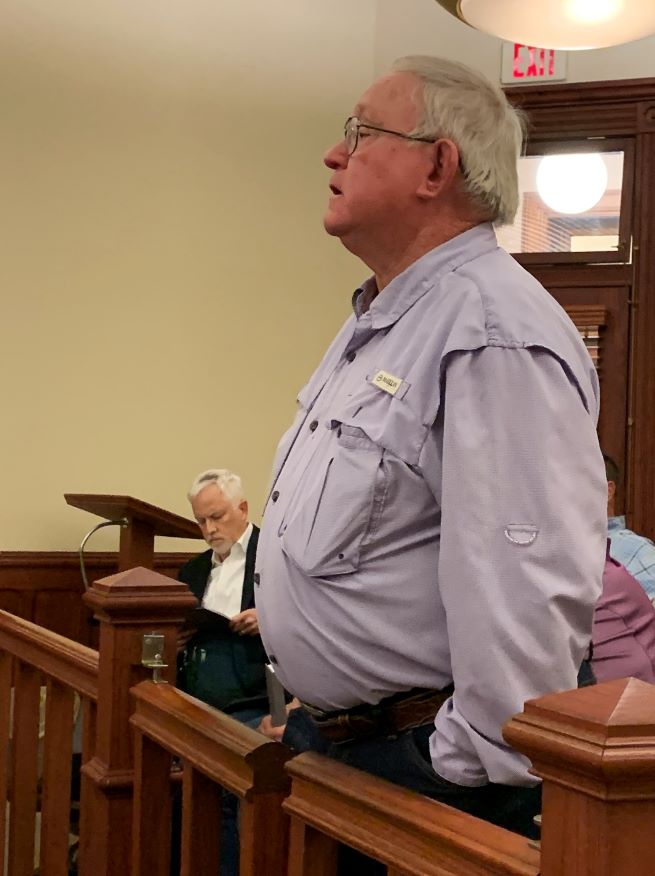
Wayne Ray acknowledged he was one of the Dike residents who addressed the court at the Commissioners Court meeting referenced by Barnes, and Monday again voiced his opinions on the topic.
“I don’t want no more government. I don’t want no more taxes. “This year, I’m going to pay taxes on my little lot in Dike, Texas. I will pay more taxes than I paid for the property this year. I do have concerns. I see no reason for Dike to be a city,” Ray said. “We don’t have any services. We don’t have any sewage or water or anything to provide services. I see no reason for a city in Dike.”
He said based on a little research he’s done, it’s his understanding that those seeking incorporation will have to have conducted a survey of the area. As far as he’s concerned, the post office is as close as Dike should be to a city. Based on the information he’s read, only a 2-mile area would be included if some other Dike residents are successful in making Dike an incorporated area. That, he said wouldn’t even come close to being a large enough area to get satellite service extended to Dike.
“I’m not about whether to have solar or not solar, I’m about property rights. And the people that own this property, I’m happy for them that they’re going to get some income out of this property,” Ray said.
“I’m sure not an expert, but the windmills and solar deal have always excited me. It’s a new way. I remember a kid in school and them telling us that someday we’re going to get energy from the sunlight and we’re going to actually get to talk to someone and see them on the phone, and I thought they were nuts. Here were are. We’ve got to have electricity,” Ray said.
“I got to see the coal mine start and I got to see it close. There were lots of people here and all over Northeast Texas that made a good living from the coal mine. Solar power is not going to bring that kind of income to everybody, but the people that own the property, I’m happy for them,” Ray added. “It’s a good income. No cow is ever going to make that kind of money for them.”
Ray said he’s thankful in retirement to be able to travel. One thing he now does is stop and take pictures of solar facilities. One recent photo shows solar, wind power and farming in the same spot.
“I just can’t see what the problem is. I sure can’t see invoking what their desires are on all of us. I just don’t see a reason for a city in Dike,” Ray concluded.
Dike property owner Tim Fuller thanked the Commissioners Court for their “forward thinking in allowing the solar powers to come in.”
“Personally, I think it’s the way to go. We already know fossil fuels are not the way to go in terms of our environment,” Fuller said. “It all goes back to, this is my piece of property. I’d like for this to happen. Thank you.”
Dike property owners Melanie Helm said the decision she and Jonas made to lease their property for solar energy production was not a decision they made hastily nor did they take the potential impact lightly.
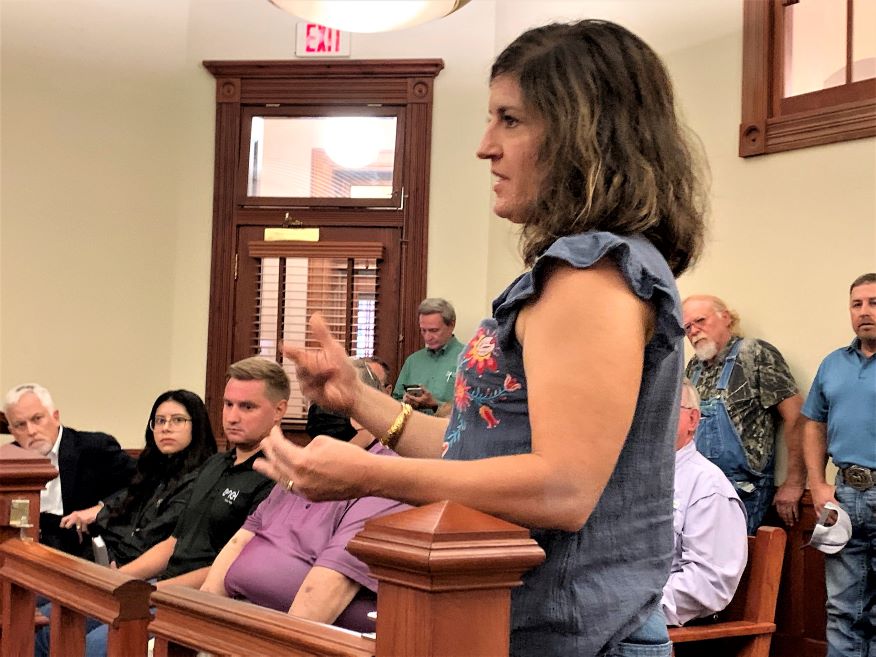
“This is something that we prayed about, something that we looked at,” Melanie Helm said. “We’ve done a lot of business decisions over the years. It’s not something we enter into lightly or take for granted. We thought about it. We looked at the pros and cons. It was something that we thought would be a good investment on our property as opposed to the cattle, that would be a lasting investment for our family, something that we could pass on to our family rather than later on after we’re gone having to divide the property up, having to have it sold off in different sections. This is something that we can pass on to our children and their grandchildren, be an investment and an income for them.”
Jonas Helm too emphasized the thought and work put in before he and Melanie reached the decision to allow part of a solar farm to be located on their property.
“We didn’t look at this and just sign a piece of paper and say this is what we want to do. We had a lot of thoughts, we had a lot of prayers about ‘Is this what we want to do?’ for not only for our future, for our kids and our grandkids. Never, once was it done in a malicious act of ‘Oh, I’m going to put this in Dike to destroy the community,” Jonas Helm said.
Only after months of going over the contract with lawyers did Jonas Helm sign an agreement allowing the solar project on the property.
“The contract reads exactly like I want that contract to read. I am part of that community. We bought that property in ’95. I’ve been in that community a lot longer than that, but I have owned that property since ’95,” Jonas Helm told the community members present at the Sept. 13 Commissioners Court meting.
Mrs. Helm noted she lived in Dike for 17 year and grew up in the community attending Sulphur Bluff schools. Solar panels are designated to be installed on the old homeplace she still considers home. Thus, she reasoned, if anyone is affected by it, her family would be. She said those properties the developer was focusing on to become part of a solar project received letters in 2019 notifying them of the company’s goal and intent.
“If you did not receive a letter, then it didn’t pertain to you. You would not be affected by it, and so, therefore, you didn’t know about it.” she said.
Melanie Helm too called the issue a private property issue, of her doing what she chooses to do on her private property, just as others can do with their property as they will.
“I may not like what you put on your property. I may not like what color your house is. I may not like what you do on your property, but it is private property,” Melanie Helm said. “Private property landowners have rights that you can’t take away.”
She said if she put a trailer home park or RV park on her land the community likely wouldn’t fight either of those, but estimated either would be more damaging than solar panels.
“I think if we start taking rights away from private land owners that you take just a little bit of our freedom away – just a little bit, bit by bit,” Mrs. Helm said.
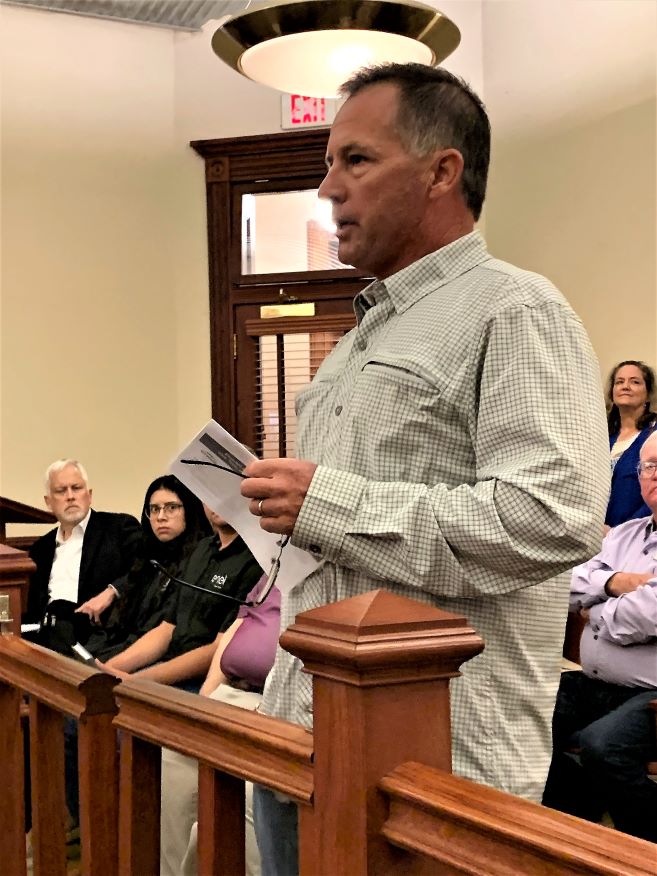
Her husband said he’s heard a lot of reasons given in opposition to solar, including potential flooding, heat and noise. The truth, for Jonas Helm, is that other community members don’t want the solar farm in Dike, which he sees as a private property issue.
“I’ve heard about everything you can possibly come up with, but the truth of the matter is they don’t want it at Dike. And, the problem with that truth is that it’s a private property issue. You don’t want me telling you what you do on your property, but you’re not going to tell me what I want to do to my property,” Jonas Helm said.
The Helms noted the revenue the taxing entities receive from the solar projects will continue to benefit the community for generations after the project is complete, in improvements to Sulphur Springs and Sulphur Bluff ISDs, where public school children in Dike attend classes, as well as infrastructure.
According to Pentak. Sulphur Buff ISD and Sulphur Springs ISD will receive approximately $571,000 a year in combined revenue over the life of this project, a significant sum that could help employee and hire teachers, and help do things for hte schools that they need.
“How can you say you are going to save Dike when you’re trying to take this tax revenue away from the schools, that will help these schools for the next several generations?” Jonas Helm pointedly asked when speaking later during the meeting.
Mrs. Helm thanked the Commissioners Court for being forward thinking and “seeing that this is something that would greatly benefit the county.” Mr. Helm thanked them for “the job you’ve done, for making the decision you did..”
“I think it’s a great decision. I have a lot of people who call me, giving me support on a weekly basis on this project. So I just again wanted to come up here and thank y’all for what you’ve done, and anything I can do to help, just let me know,” Jonas Helm told the elected officials.





